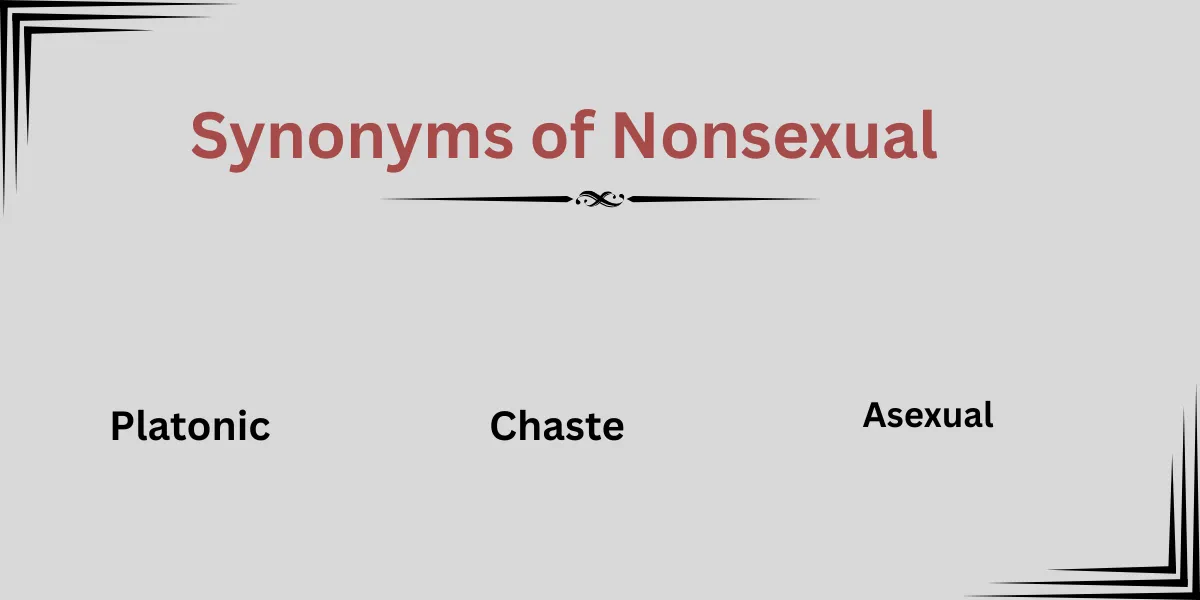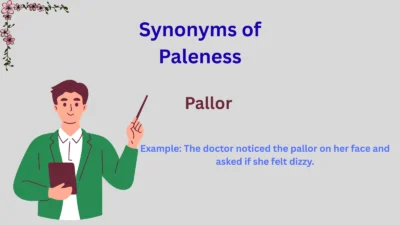Synonyms of nonsexual, such as platonic, affectionate, and asexual, describe feelings, relationships, or behaviors that don’t involve sexual attraction. For example, a platonic friendship shows care and closeness without romance or desire. These words help you express warmth, respect, or connection without physical intent.
If you’re writing about emotions, relationships, or identity, choosing the right synonym for nonsexual adds clarity and sensitivity to your message.
In this guide, you’ll learn the meaning and example sentence for each synonym of nonsexual, so you can describe pure affection or emotional bonds with confidence and understanding.
What Does Nonsexual Mean?
Nonsexual means something that does not involve or relate to sexual feelings, attraction, or activity. It describes actions, relationships, or identities focused on emotional, friendly, or spiritual connection rather than physical desire.
Depending on how it’s used, non-sexual can express:
- Platonic affection — love or care without romantic intent
- Emotional closeness — deep bonds based on trust and understanding
- Personal identity — when someone feels little or no sexual attraction
- Respectful boundaries — interactions free from sexual meaning
At its heart, nonsexual celebrates genuine connection and human warmth without crossing into desire. It reminds us that closeness doesn’t always need romance — sometimes, care itself is enough.
30 Synonyms of Nonsexual (With Meanings, Examples & Usage Tips)
1. Platonic
Meaning: Deeply affectionate but not romantic or sexual.
Example: Their bond was purely platonic, built on mutual respect and trust.
When to Use: Ideal for describing close friendships where emotional intimacy exists without sexual attraction. Common in literary and social contexts.
2. Asexual
Meaning: Relating to a person who experiences little or no sexual attraction.
Example: He identifies as asexual and values emotional connection over physical intimacy.
When to Use: Use in sexual orientation contexts, not just behavior. Avoid confusing it with “celibate.”
3. Chaste
Meaning: Abstaining from sexual activity, often for moral, religious, or personal reasons.
Example: She led a chaste life devoted to spiritual growth.
When to Use: Appropriate for formal, religious, or moral discussions.
4. Celibate
Meaning: Refraining from sex, especially by choice or vow.
Example: Priests are expected to remain celibate.
When to Use: Refers to behavior, not orientation—often associated with religious discipline or personal commitment.
5. Pure
Meaning: Free from moral or sexual corruption.
Example: Her pure affection came from a place of genuine care.
When to Use: Conveys innocence or sincerity; works in romantic or spiritual writing.
6. Innocent
Meaning: Lacking experience or awareness of sexual matters.
Example: Their relationship was innocent, full of laughter and simplicity.
When to Use: Often describes youthful or naïve relationships or tones.
7. Pristine
Meaning: Untouched or unspoiled.
Example: The film portrayed their pristine friendship beautifully.
When to Use: Use metaphorically to describe untainted affection or purity.
8. Modest
Meaning: Reserved or restrained about sexual matters.
Example: His modest nature made him uncomfortable with flirtation.
When to Use: Suggests personality traits—not necessarily lack of sexual attraction but reserved behavior.
9. Demure
Meaning: Quiet, modest, and reserved—especially in a way considered ladylike.
Example: Her demure smile revealed her shy nature, not disinterest.
When to Use: Good for describing tone or demeanor, especially in formal or traditional contexts.
10. Unromantic
Meaning: Lacking romantic or sentimental elements.
Example: He approached the partnership in an unromantic, practical way.
When to Use: For situations or relationships lacking emotional or romantic undertones.
11. Dispassionate
Meaning: Free from strong emotion or passion.
Example: She gave a dispassionate account of their breakup.
When to Use: Ideal for analytical or professional contexts, not personal relationships.
12. Neutral
Meaning: Without emotional or sexual bias.
Example: His comments were neutral, with no hint of flirtation.
When to Use: Best for describing behavior or tone in workplace or public settings.
13. Affectionate
Meaning: Showing warmth and love, but not necessarily romantic.
Example: They had an affectionate friendship filled with hugs and laughter.
When to Use: Good for friendly closeness—especially when physical affection is present but nonsexual.
14. Cordial
Meaning: Warm, respectful, and polite without intimacy.
Example: Their cordial relationship remained steady through the years.
When to Use: Common in professional or diplomatic situations.
15. Amicable
Meaning: Friendly and peaceful, especially after disagreement.
Example: They maintained an amicable bond even after the breakup.
When to Use: For post-relationship or collaborative dynamics without emotional tension.
16. Brotherly
Meaning: Displaying affection typical of a brother.
Example: He treated her with brotherly care and respect.
When to Use: Great for describing protective, familial affection in friendships.
17. Sisterly
Meaning: Expressing warmth and support, like that of a sister.
Example: Her sisterly advice always came from love, not judgment.
When to Use: To describe nurturing, familial affection from a woman toward others.
18. Fraternal
Meaning: Relating to friendship or brotherhood.
Example: The team shared a fraternal spirit built on trust.
When to Use: Common in group or community settings—nonsexual but emotionally bonded.
19. Maternal
Meaning: Showing care like a mother would.
Example: Her maternal affection made everyone feel safe.
When to Use: For nurturing, protective affection, especially from women.
20. Paternal
Meaning: Showing fatherly concern or affection.
Example: His paternal tone was both firm and kind.
When to Use: When describing guidance or protection, often from older men.
21. Companionable
Meaning: Pleasant and friendly, easy to be around.
Example: Their companionable bond made working together enjoyable.
When to Use: For comfortable friendships without romantic layers.
22. Friendly
Meaning: Kind and supportive; not romantic.
Example: They exchanged a friendly hug after the meeting.
When to Use: Everyday synonym—safe for professional and casual contexts alike.
23. Respectful
Meaning: Showing regard for boundaries or consent.
Example: He was respectful and never crossed personal limits.
When to Use: Especially good in workplace or gender-interaction discussions.
24. Professional
Meaning: Conducted within workplace ethics, not personal emotion.
Example: Their communication remained strictly professional.
When to Use: Business, academic, or formal relationship contexts.
25. Amiable
Meaning: Pleasant, friendly, and likable.
Example: His amiable personality made everyone comfortable.
When to Use: Suitable for neutral positivity—good for tone descriptions.
26. Nonromantic
Meaning: Lacking romance but possibly affectionate.
Example: Their nonromantic partnership was still deeply meaningful.
When to Use: Closest literal synonym—use when romance is the excluded element.
27. Affective
Meaning: Concerned with emotion rather than sexual desire.
Example: The movie explored affective bonds between friends.
When to Use: For psychological, artistic, or academic discussions about emotions.
28. Unflirtatious
Meaning: Lacking flirtation or sexual suggestion.
Example: She maintained an unflirtatious manner despite his charm.
When to Use: In behavioral or workplace descriptions.
29. Compassionate
Meaning: Motivated by empathy and kindness, not attraction.
Example: His compassionate gesture was purely from the heart.
When to Use: For acts of care or support with moral warmth, not romantic intent.
30. Sincere
Meaning: Genuine, honest, and without hidden motives.
Example: Her sincere appreciation had nothing to do with attraction.
When to Use: Good for expressions of gratitude or friendship where clarity matters.
💡 How to Choose the Right Synonym for Nonsexual
When selecting the best synonym, consider context, emotion, and intent:
- For friendships: “Platonic,” “affectionate,” or “companionable.”
- For workplace or public tone: “Professional,” “respectful,” or “neutral.”
- For familial warmth: “Brotherly,” “maternal,” or “paternal.”
- For moral or spiritual tone: “Chaste,” “pure,” or “celibate.”
- For psychological or emotional discussion: “Affective,” “dispassionate,” or “nonromantic.”
Emotional Tone Matters
- Warm & Human: Affectionate, compassionate, friendly.
- Reserved & Formal: Cordial, professional, unflirtatious.
- Philosophical or Religious: Chaste, pure, celibate.
- Gendered Warmth: Brotherly, sisterly, paternal, maternal.
🌍 Cultural and Emotional Nuances
Cultural sensitivity matters when describing nonsexual behavior or attraction.
- In Western contexts, “platonic” is often ideal for friendships.
- In Eastern or religious contexts, “chaste” or “pure” carries moral weight.
- In academic or psychological writing, “asexual” or “affective” feels more clinical.
Choose based on social tone and audience expectations.
Conclusion:
Synonyms of nonsexual, such as platonic, asexual, and chaste, show how people can connect without romance or desire. Each word highlights different ways to express care, trust, and respect in relationships.
Using these synonyms helps you write about friendships, emotional bonds, and personal boundaries clearly and thoughtfully. They remind us that meaningful connections don’t always involve romance—sometimes, genuine affection and understanding are enough to strengthen human ties.




